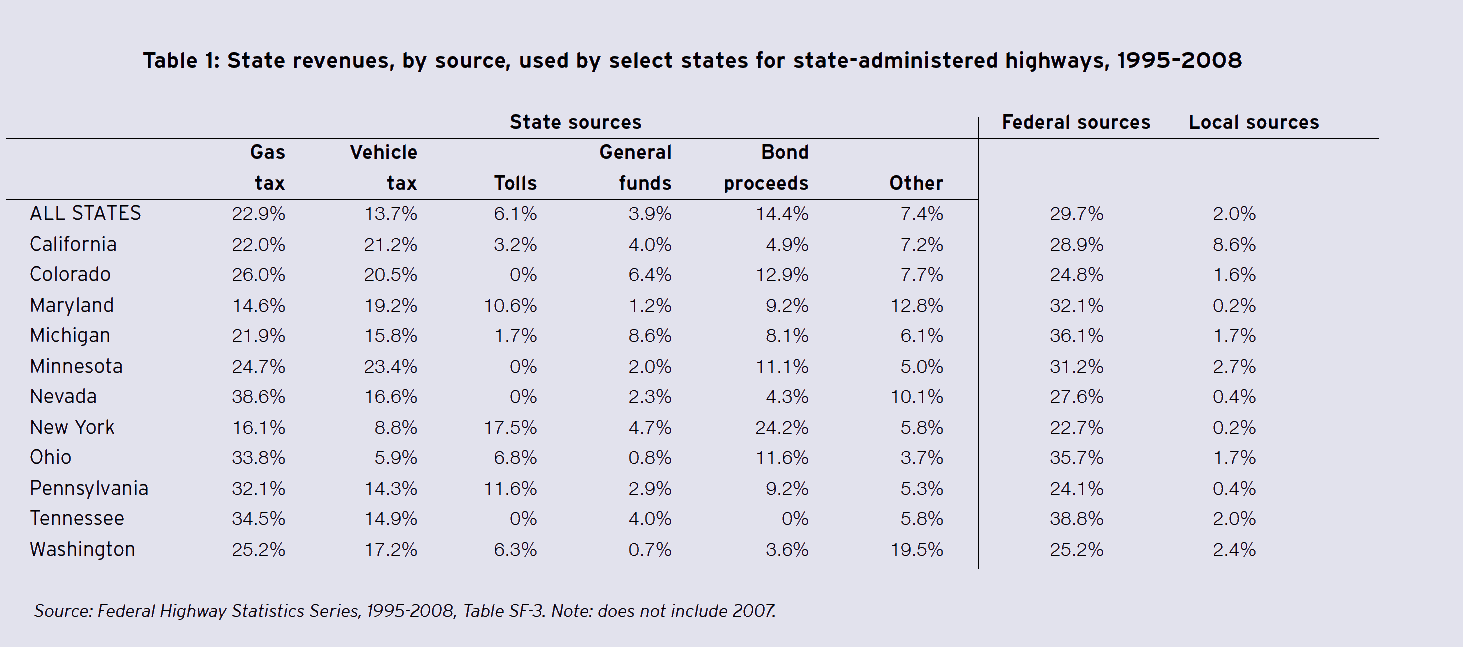BROOKINGS-ROCKEFELLER PROJECT ON STATE AND METROPOLITAN INNOVATION
I. Introduction
Infrastructure—along with human capital and innovation—is one of the assets that will drive the next economy and is of paramount importance to maximizing growth and opportunity. Yet in the United States, transportation and infrastructure policy is at a crossroads. The current system is both broke and broken, most recently illustrated by delays in reauthorizing federal transportation laws. Though infrastructure was a prominent feature of the American Recovery and Reinvestment Act (the stimulus package) no consensus over the next generation of transportation policy has yet emerged in Washington.
In the absence of federal action, the debate on transportation policy will shift to the state level. Few areas of policy are as critical to states’ long term economic health. Transportation is also a relatively significant portion of most states’ budgets. At 7.9 percent of general state expenditures, “transportation” generally ranks third among state spending categories after only “education” and “public welfare,” though this varies quite a bit among the states (Alabama ranks last at 3.1 percent; Nevada ranks first at 16.7 percent. Missouri is the median at 10.7 percent).
Transportation is also a significant employment sector, providing jobs to more than 4 million Americans. Yet even thought there was a slight uptick in the number of workers employed in transportation, most states, like Colorado (-5,000), New York (-12,000), Tennessee (-1,400), and Michigan (-5,100) saw job declines in this sector.
While state governors and legislatures recognize that their systems are job and economic engines, infrastructure investments and the decision-making process around transportation priorities have not kept pace with the growth and evolution of the economy. A more export-oriented economy will require revolutionizing our ports to support next generation shipping and telecommunications exchanges. A lower carbon future means we need to remake a transportation system almost totally dependent on petroleum-based fuels. To lead on innovation, we need to make quantum leaps on new, clean infrastructure technologies. And to ensure our investments are opportunity-rich they can no longer be sprawl-inducing and decentralizing.
But these elements tend to receive insufficient consideration in state transportation programs and planning.
To bridge this gap, states should:
- Use transportation dollars to leverage other state investments and the strengths of metropolitan areas.
- Use market discipline to find savings and new revenue sources
- Create or augment new public/private institutions like State Infrastructure Banks
II. Challenges
A 21st century state transportation strategy that strengthens metropolitan America and is tightly linked to the vital elements of the next economy is critical for our nation to emerge from the rubble of the recession. Yet state transportation systems face two overarching challenges: they are both broke and broken.
First, state transportation funding sources are shrinking. Twenty-one states—including New York, Illinois, and Florida—saw transportation program area cuts in fiscal year 2010 and 11—like Michigan— expected cuts for the next fiscal year. Part of the states’ funding problem is that they are still heavily reliant on the motor vehicle fuel tax (the gas tax) for the bulk of their transportation revenues. From 1995 to 2008, more than half of the funds states used for highways came directly or indirectly through state and federal gas taxes (Table 1). But slowdowns in fuel consumption overall and stagnant gas tax rates have squeezed this revenue source.
…
 Download full version (PDF): State Transportation Reform
Download full version (PDF): State Transportation Reform
About the Brookings-Rockefeller Project on State and Metropolitan Innovation
www.brookings.edu/metro/StateMetroInnovation
“States and metropolitan areas will be the hubs of policy innovation in the United States, and the places that lay the groundwork for the next economy. The project will present fiscally responsible ideas state leaders can use to create an economy that is driven by exports, powered by low carbon, fueled by innovation, rich with opportunity and led by metropolitan areas.”
Tags: Brookings Institution, Brookings-Rockefeller Project on State and Metropolitan Innovation, Rockefeller Foundation






 RSS Feed
RSS Feed